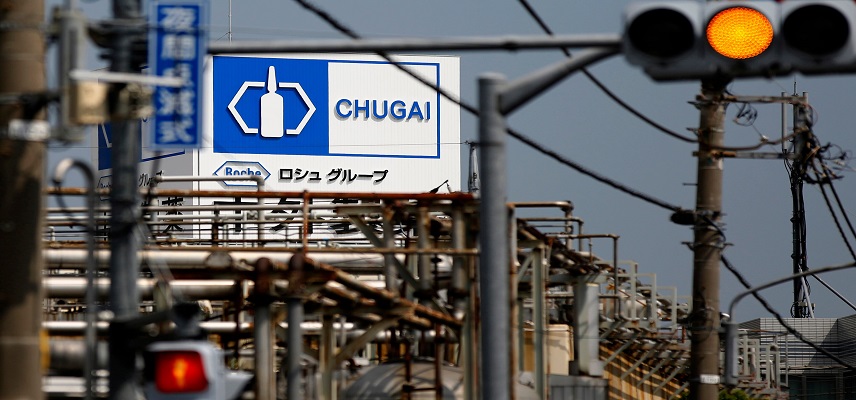Chugai Seeks Additional Indication Approval From Japan MHLW For Vabysmo
Chugai seeks additional indication approval from Japan MHLW for Vabysmo to treat angioid streaks associated with neovascularization
Overview
Chugai Pharmaceutical Co., Ltd., a drug manufacturer operating in Japan and a subsidiary controlled by Hoffmann-La Roche, announced that it filed for an additional indication with the Ministry of Health, Labour and Welfare (MHLW) for anti-VEGF/anti-Ang-2 bispecific antibody Vabysmo intravitreal injection 120 mg/mL [generic name: faricimab (genetical recombination)], for the treatment of angioid streaks associated with neovascularization. For this indication, Vabysmo received orphan drug designation from the MHLW, and the applications will be reviewed under priority review.
Words from the CEO: Chugai
Angioid streaks is a rare disease with no approved products in Japan. We will continue to work for approval as soon as possible so that Vabysmo, which demonstrated vision improvement in a Japanese phase III study, can contribute to the treatment of patients as a new option for angioid streaks,” said Chugai’s president and CEO, Dr. Osamu Okuda.
This application is based on the results of a Japanese phase III study, the NIHONBASHI study for angioid streaks associated with neovascularization.
About Angioid Streaks
- Angioid streaks is a disease characterized by cracks in parts of the retina, causing-discoloration (pigmented streak) of the fundus.
- The disease is often asymptomatic, and when choroidal neovascularization extends to the macula region of the fundus, it causes symptoms such as decreased or distorted vision.
- People with neovascularization have a poor prognosis, but conventional treatments such as surgery and laser are not sufficiently effective, and new treatment options are needed.
- The number of patients with angioid streaks in Japan is unknown, but approximately 300 patients have pseudoxanthoma elasticum (one of the designated intractable diseases), which is known to be associated with angioid streaks in approximately half of patients.
About NIHONBASHI Study
- NIHONBASHI study is a multicenter, single-arm phase III study in Japan evaluating the efficacy and safety of Vabysmo for the people with angioid streaks associated with neovascularization.
- 24 people were enrolled into this study. The primary endpoint is the change in best-corrected visual acuity (BCVA) score (the best distance vision a person can achieve – including with correction such as glasses – when reading letters on an eye chart) from baseline at 12 weeks.
- Secondary endpoints include the mean change in BCVA score at 52 weeks, change in central subfield thickness from baseline over time, and safety.
Abut Vabysmo
- Vabysmo is the first bispecific antibody approved for the eye.
- It targets and inhibits two signaling pathways linked to a number of vision-threatening retinal conditions by neutralizing angiopoietin-2 (Ang-2) and vascular endothelial growth factor-A (VEGF-A).
- Ang-2 and VEGF-A contribute to vision loss by destabilizing blood vessels, causing new leaky blood vessels to form and increasing inflammation.
- By blocking pathways involving Ang-2 and VEGFA, Vabysmo is designed to stabilize blood vessels.
- Vabysmo is approved in nearly 100 countries around the world, including the United States (US), Japan, the United Kingdom and the European Union, for people living with neovascular or ‘wet’ age-related macular degeneration and diabetic macular edema, and in several countries, including the US, EU and Japan, for the treatment of macular edema following retinal vein occlusion. Review by other health authorities is ongoing.

Optimize Your trial insights with Clival Database.
Are you exhausted from the uncertainty of trial insights pricing? Clival Database ensures the clarity in the midst of the global scenario for clinical trials to you.Clival Database is one of the best databases that offers an outstanding number of clinical trial data in terms of 50,000+ molecules and from primary regulatory markets as well as new entrants like Indian and Chinese markets.
With Clival, you get accurate positioning of historical sales data, patent database, company profiling, safety & efficacy, and prediction of launch of new innovative molecules helping you to align your research and driving down the cost.
To add value, we further break down our analytics for you so that improving your operational effectiveness; optimizing your clinical trials; and offering you accurate and high-quality data at lowest possible prices becomes possible.
Elevate your trial success rate with the cutting-edge insights from Clival database.
Check it out today and make more informed sourcing decisions! Learn More!







